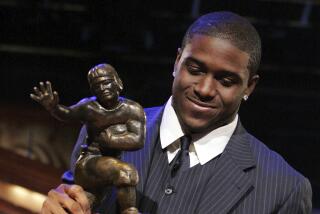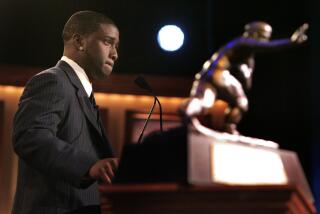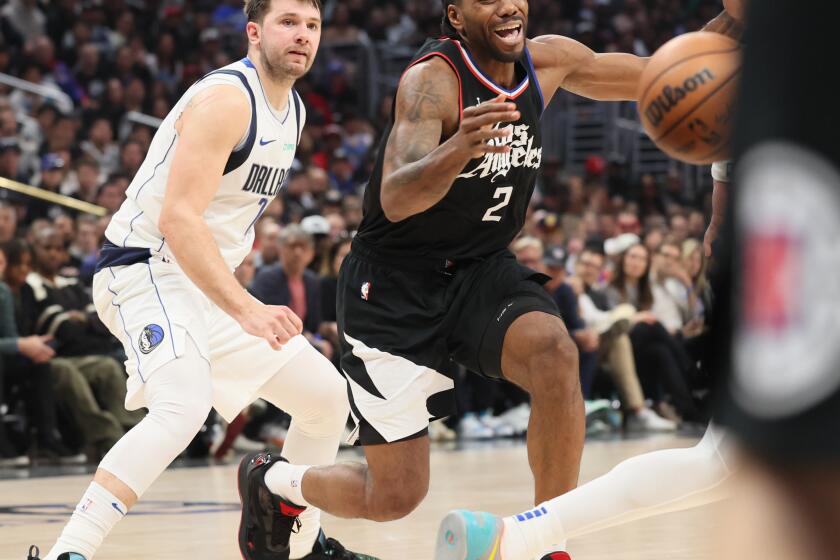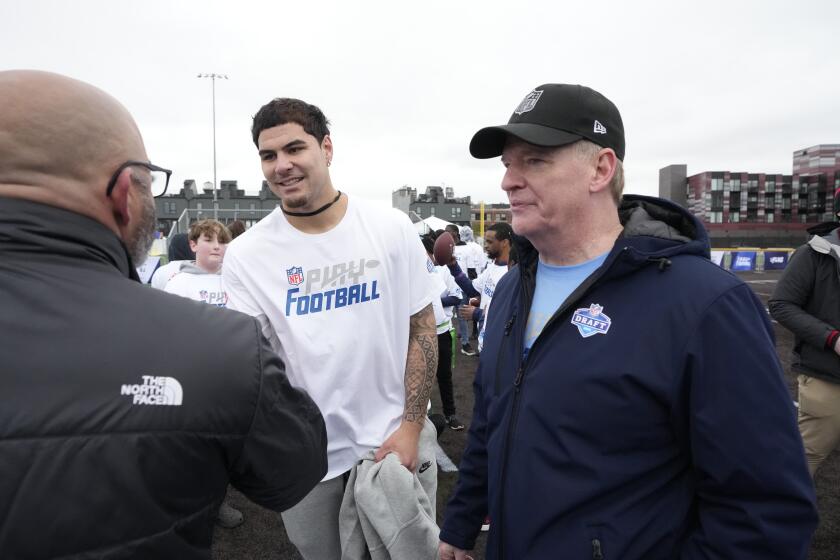Sergey Kovalev hopes to enhance the legacy of boxing champions from Eastern Europe
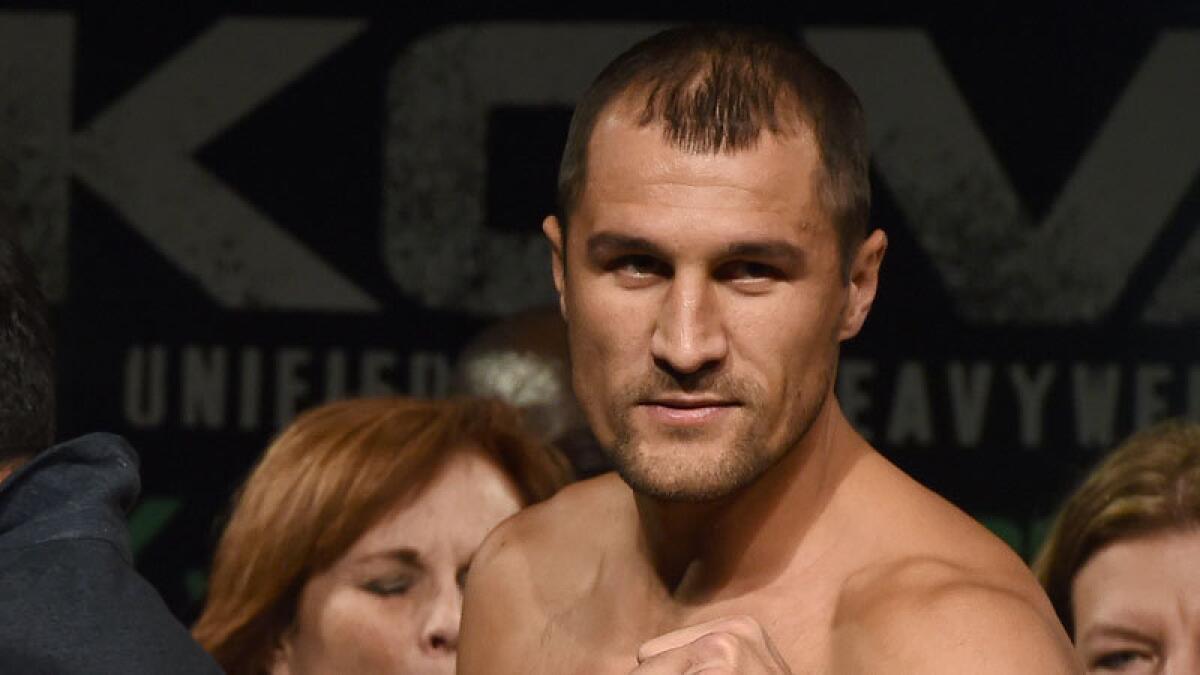
The arrival of Russia’s Sergey Kovalev in the most important boxing match of the year punctuates a near-100-year journey for Eastern European fighters to reach such a landmark event.
Kovalev (30-0-1, 26 knockouts) will defend his three light heavyweight belts Saturday against former super-middleweight and U.S. Olympic champion Andre Ward (30-0, 15 KOs) in an HBO pay-per-view bout from T-Mobile Arena.
The path to professional fighting success in the U.S. was laid by Kovalev’s predecessors whose families immigrated here. The first world boxing champions from Russia, Benny Bass and Louis “Kid” Kaplan, accompanied their families to the U.S. as small children.
Kaplan, born in 1901 in Kiev, was raised in Meriden, Ct., and was known as the “Meriden Buzzsaw.” Kaplan relied on a pressing style to win a featherweight belt at Madison Square Garden in 1925.
Bass, also a member of the International Boxing Hall of Fame and born in Kiev, relocated to Philadelphia and became a junior-lightweight champion in 1929 at age 25.
“Neither ever fought in Ukraine or Russia, and that was it [for Eastern European world champions] for about 60 to 70 years,” said boxing historian Steve Farhood, a broadcast analyst on Showtime.
Russian-born David Montrose, known as “Newsboy Brown,” was voted into the Hall of Fame for a flyweight career that included 89 bouts and a notable appearance on the debut card at the famed Olympic Auditorium in Los Angeles in 1925.
Farhood said in that era it was common for Irish, Italian and Jewish fighters to change their names to enhance the promotion. One was Joseph Paul Cukoschay, a short-time heavyweight champion with Lithuanian roots better known by his fighting name: Jack Sharkey.
Sharkey is the only man to fight Jack Dempsey and Joe Louis. He fought for the vacant heavyweight title in a 1932 rematch against Max Schmeling and won by a controversial split decision, only to lose the belt to Primo Carnera, a mob-connected fighter he’d previously defeated.
“A lot of the great Jewish fighters from the 1920s and 1930s had Eastern European roots,” Farhood said, mentioning Barney Ross and Benny Leonard by name, “but almost all of them were born in the U.S.”
Kovalev was raised by a mother who worked as a factory crane operator and scrapped through poverty. He recalls starting with hand-me-down horsehair gloves that were so frayed and damaged the pain from punching moved him to tears.
“Nobody was going to rub your head to make you feel better,” Kovalev said. “There were lots of kids — 25 to 30 in there — and we grew up in a neighborhood where you cannot show pain or cry.
“Growing up, I realized only boxing can bring me what I want to be — it was my dream to get money for my family. I don’t feel as if I have a talent. I have a love of work. What I’ve done is a result of my hard work. I decided to be a champion. … If I see [a] goal, I will try to get this goal in any way.”
Kovalev’s Lithuanian manager, Egis Klimas, who brought his fighter to the U.S., has set up more than a dozen Eastern European fighters at trainer Robert Garcia’s gym in Oxnard, including Ukrainian super-featherweight world champion Vasyl Lomachenko and unbeaten Lithuaninan welterweight Egidijus Kavaliauskas.
“It’s my dream to help him [Kavaliauskas] become the first world champion from my land since Sharkey,” Klimas said.
Russian Olympian Kostya Tszyu won a junior-welterweight world championship in 1995 and defeated Roger Mayweather and Julio Cesar Chavez Sr. before injuries befell him.
In 1991, a Latvian cruiserweight, Yuri Vaulin, was part of New York businessman Lou Falcigno’s “Great Experiment” to create a world champion from the Soviet bloc. Vaulin never won a title and was knocked out three times in 16 bouts.
“Here’s the problem,” trainer Tommy Gallagher confided to then-Times reporter Earl Gustkey in 1991. “Yuri had 300 amateur fights. Every time I talk to him, I see a little voice in him saying, ‘Hey, I’ve had 300 fights . . . Why is this guy telling me how to box?’”
Yet, the idea of mining boxing gold in the Eastern Bloc was sound. The Ukraine-born heavyweight champion Klitschko brothers, Wladimir and Vitali, were dominant, even if they weren’t embraced in the U.S. after the Mike Tyson era.
That stigma remained as recently as five years ago, said Klimas, who brought Kovalev to the U.S. in 2009, first under the guidance of former heavyweight champion Evander Holyfield’s trainer, Don Turner.
“If a fighter is a good athlete and exciting in the ring,” Turner told Klimas, “you don’t have to worry about the color or the origin or the religion of the guy. The fans will go crazy for him.”
Klimas recalled being told by an ESPN executive, “Nobody watches Russians.” But the manager invested $400,000 in Kovalev, who has won belts and defeated legendary Bernard Hopkins en route to this greatest test against Ward.
“When I first met Egis,” Kovalev recalled Thursday, “my first question was, ‘How much will you pay me for the first fight?’ and he told me, ‘Nothing.’”
Said Klimas: “I told him, ‘If you can make the American audience like you — if people will buy tickets and buy your fight — you’ll make it.’”
FAST FACTS
Sergey Kovalev (30-0-1, 26 KOs) vs. Andre Ward (30-0, 15 KOs) for Kovalev’s WBA, IBF and WBO light-heavyweight belts
When: Saturday, 6 p.m. Pacific
Where: T-Mobile Arena, Las Vegas
Television: HBO pay-per-view, $54.95
Undercard: Oleksandr Gvozdyk (11-0, 9 KOs) vs. Isaac Chilemba (24-4-2, 10 KOs), light-heavyweights; Curtis Stevens (28-5, 21 KOs) vs. James De La Rosa (23-4, 13 KOs), middleweights; Maurice Hooker (21-0-2, 16 KOs) vs. Darleys Perez (33-2-1, 21 KOs), welterweights
Twitter: @latimespugmire
More to Read
Get our high school sports newsletter
Prep Rally is devoted to the SoCal high school sports experience, bringing you scores, stories and a behind-the-scenes look at what makes prep sports so popular.
You may occasionally receive promotional content from the Los Angeles Times.

